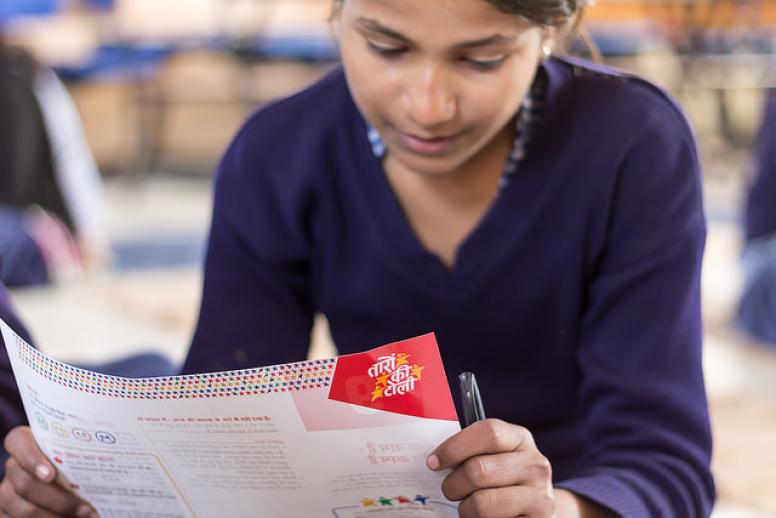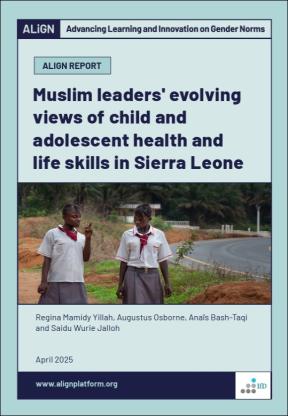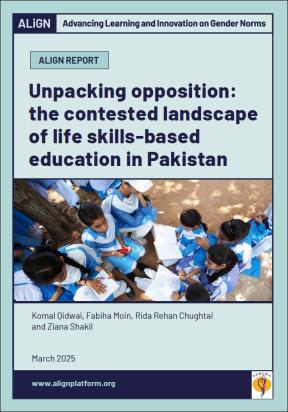- Case study
- 5 November 2018
Gender equality in schools - a look at the Taaron Ki Toli programme in India
- Author: Sunita Menon
- Published by: ALIGN, Breakthrough

“Why am I not allowed to play and am forced to do all household chores, while my brother gets to play whenever he wants to?” asks 11-year-old Seema from Rohtak, Haryana, India.
Seema’s question reflects deep-rooted gender norms, a reality for adolescents in India. Gender-related challenges such as restrictions on mobility, lack of schooling or dropping out of school, early marriage and violence, persist in creating unfair disadvantages for girls. At the same time, rigid gender norms, and harmful perceptions of what it means to be a man, encourage adolescent boys to engage in high risk behaviours and condone violence against women.
Global human rights organization, Breakthrough, designed and implemented Taaron ki Toli (TKT) (Gang of Stars), a gender equity programme which launched in 2014. The programme works in 150 schools with around 18,000 adolescent girls and boys in four districts of Haryana. It provides a safe platform and facilitative environment where adolescents can participate in decision making on issues affecting their lives. By building their knowledge, adolescents can adopt positive practices, access preventive, curative, protective services and enhance their skills and participation within their school, family and community.
Key programme elements
The programme started with a tri-party agreement between implementation partner Breakthrough, J-PAL South Asia who are the research partner, and the Government of Haryana’s Department of Education. The pilot programme, accompanied by a rigorous evaluation, was designed to help scale up the programme across the state.
Breakthrough gathered inputs from various education officials and school principals and conducted multiple district-wide trainings of school teachers to build their involvement and engagement. Each school was guided by a teacher coordinator (“Druv Tara” - guiding star). The Druv Taras organized the TKT programme in schools, observed the sessions, and maintained reports on the programme within the school. The Druv Taras supported the students by addressing their concerns, organizing events and building an enabling environment at the school. Through consistent effort and intervention the Druv Taras and Breakthrough facilitators helped halt child marriage, ensure continued education for girls, prevent sexual harassment and create spaces for adolescents to assert themselves within their schools and communities.

Breakthrough worked with local facilitators to help build their capacity within communities looking at gender, sexuality, rights, adolescent empowerment, facilitation skills, and community mobilisation. Trained Breakthrough facilitators visited the schools every 2-3 weeks and conducted 45-minute-long sessions based on a gender and rights workbook and other applied tools and exercises as part of TKT club intervention during school hours.
In each school, Breakthrough created a Taaron ki Toli adolescent club where all participating students were invited to enroll and sign pledges to declare their commitment to participate in the club activities. In turn, students received a TKT workbook and branded materials such as caps and badges with the club’s logo. Breakthrough considers each adolescent to be a ‘star’, and together they have the potential to make a difference in their lives, homes, schools, and communities.
Breakthrough designed a curriculum for Taaron Ki Toli clubs with 32 45-minute classroom sessions and 12 assembly-based sessions focusing on:
- Psycho social skills
Getting to know oneself, one’s values, gender identity, aspirations, goals, and strengths in life, to create new identities and aspirations for a better tomorrow.
- Interpersonal skills
Interpersonal skills such as communications, assertiveness and trust building, leadership skills, presentation skills, organizing short campaigns for creating common strengths, and modelling new behaviours drawn out of secure relationships and friends in the club.
- Community action
Within TKT clubs the students led school assembly activities and a media and communications campaign through intergenerational dialogue, petitions, Facebook live, poetry, street theatre, puppet shows, and songs on creating safe school environment. The sessions created awareness on gender discrimination, changed dominant gendered perceptions and promoted gender equitable attitudes among adolescents and their school and community environment. The programme aimed to influence a wide range of behaviours related to their health, safety, mobility, education, careers, leisure and age of marriage.
Through the Taaron ki Toli clubs adolescents also interacted with various stakeholders, such as members of local self-government, frontline health workers, child protection officials, police, lawyers, journalists and celebrities to discuss and gain information regarding issues such as health, education, careers and legal services.
Programme impacts – key learnings
The randomised control trials undertaken by J-PAL revealed that:
- TKT has a significant positive effect on participants’ attitudes towards employment. Results suggest that it led to a seven-percentage point increase in positive attitudes towards women’s paid employment outside the home. Changes were similar for boys and girls.
- TKT led to an increase of four-percentage points in positive attitudes towards girls’ education .
- Programme participants also reported more gender-equitable behaviour such as increased interaction with the opposite sex. TKT led to a three-percentage point increase in the gender behaviour index, indicating a more progressive behaviour. The increase was larger amongst boys, pointing to the significance of barriers for girls to act in accordance with their own altered attitudes.
- TKT increased the aspirations index by 0.8 percentage points. (The index covered aspirations for education, expected grades, discussion of aspirations with elders and what young people expected to be doing at age 25). Differences between boys and girls were not significant.
These findings all indicate the beginnings of a shift in gender norms among participating adolescents.
The Gender Equity School Programme success has enabled Breakthrough to scale-up the programme across five Indian states of Jharkhand, Bihar, Uttar Pradesh and Delhi as well as Haryana, reaching over 600,000 adolescent girls and boys. Its successes reflect a well-developed model, taking a social-ecological approach of working at all levels. These included using media arts and culture to question gender norms at mass level, creating spaces for public debate through community mobilization programmes; sensitising families through meetings and Interactive Voice Response Systems, and building agency of adolescent boys and girls in schools.
In addition, since adolescents are legally children, we built a strong child safeguarding policy and practice to ensure that when they raised questions or challenged gender norms they had a good system of support from their peers, at the school and the community. Breakthrough developed strong partnerships with service providers, opinion leaders and other stakeholders for adolescents to have access to quality services.
Finally, partnership with the Government Education Department enabled consistency of program implementation. The investment in evaluation by J-PAL enabled the collection of evidence about the effectiveness of this approach, which enabled further scale-up.
Written by Sunita Menon, Director Curriculum and Leadership Development at Breakthrough.
Related resources
Report
14 April 2025

Report
26 March 2025

Blog
19 December 2024
